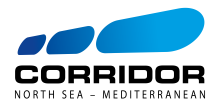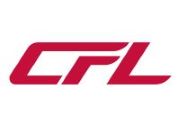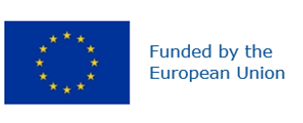We want to build bridges across Europe. RFC North Sea-Mediterranean participated to the executive board side event on the Leipzig ITF2019 together with RFC RhineAlpine on 22 May 2019. Following this event, a press release of both executive boards was distributed. You can find it hereunder.
Ministers and high-level representatives from Ministries, Infrastructure Managers and the rail sector of Rail Freight Corridors (RFC) Rhine-Alpine and North Sea - Mediterranean met on 22 May 2019 in Leipzig during a Side Event of the ITF Summit organized by the German and Swiss Ministries. Taking due account of the just published Annual Reports for 2018 of –both corridors the discussions focused on monitoring the steps made on International Contingency Management since the Rastatt incident as well as how to improve quality and punctuality.
After the Rastatt incident in 2017, rail freight traffic on the RFC Rhine-Alpine has mostly recovered. In 2018, traffic was up 2.7 % compared to a drop of 3.2 % in 2017.
In a similar Side event of the ITF Summit in 2018, the Ministers of affiliate countries signed a common declaration on the need for international contingency measures on RFC Rhine-Alpine and North Sea – Mediterranean. As follow-up, the Executive Boards of both RFCs established Action Plans to bring forward necessary measures and monitor the progress of their implementation in order to make the corridors more resilient and more attractive for the market.
During today’s side event, the Ministries and Infrastructure Managers evaluated the implementation of the Declaration on international contingency measures on RFC Rhine-Alpine and North Sea-Mediterranean in 2018. The results are encouraging as there is considerable progress in some areas:
- The concerned Infrastructure Managers prepared a rerouting catalogue, published by both RFC RhineAlpine and RFC North Sea-Mediterranean;
- New / additional procedures for contingency management have been put in place at Infrastructure Managers level;
- Pilots have started on some RFCsections to test a new approach in managing capacity (time table redesign program by RNE) on the basis of the modified Framework for Capacity Allocation;
- RFCs’ Implementation Plans have been modified to include a detailed ERTMS planning;
- Pilots for using harmonized tail signals in Italy have started in 2018 to support interoperability;
- Flexibility on the use of train driver language requirements on border sections has been enhanced in the Netherlands;
- A mature model, developed by railway undertakings, for corridor braking sheet performance in RFC RhineAlpine countries is expected to be available by 2019 ;
- OBU ERTMS financing models will be developed at several levels by 2020.
During their discussions, Ministers and high-level representatives from ministries, Infrastructure Managers and the railway sector agreed to continue concerted efforts, as expressed by the customers, to achieve harmonized infrastructure parameters on both corridors. In this way, the two corridors can improve efficiency and become viable alternatives for the railway undertakings, in case of contingencies but also for day-to-day operations. Ministers also noted the need of realistic capacity allocation frameworks to be used in case of disruption / contingencies / delays.
However, Ministers and representatives identified another challenge for the years to come: the continuously shrinking reliability and punctuality of rail freight traffic on RFC Rhine-Alpine. Recent figures show that performance on RFC Rhine-Alpine declined in 2018: entry / departure punctuality dropped from 70% to 65% and exit / arrival punctuality from 60% to 55%. In 2018, the management board of RFC Rhine-Alpine implemented a new approach to its Train Performance Management including specific task forces with stakeholders to support quality performance. On the RFC North Sea-Mediterranean, the arrival punctuality is stable (around 78%), and close to the objective of 80%, while the traffic has risen on the historical lines of the corridor by +24% since its start in 2013, transporting more than 40.000 trains per year. The concerned infrastructure managers of the RFC North Sea - Mediterranean undertook also an in-depth analysis to understand the causes of delay.
After a fruitful discussion among all participants, the Ministers and high representatives are convinced that the performance on the RFCs is a keystone for improving the competitiveness of rail freight, in addition to solving issues already identified in the Leipzig Declaration on international contingency measures. They acknowledge that all stakeholders in the transport chain are responsible for performance improvements. In this context, they welcome the initiatives of both RFC to improve the punctuality. This includes the work of the RFC Rhine-Alpine and the Swiss Federal Office of Transport to elaborate concrete solutions with railway undertakings, terminals, infrastructure managers and railway operators. This also requires considering the economic impact of quality problems on railways and the wider logistic chain including the operational impact on railway customers.
On this basis, the Ministers and high representatives invite the Executive Boards of RFC Rhine-Alpine and North Sea-Mediterranean, to take initiatives to foster the identification by the stakeholder’s commitments to improve punctuality. The Executive Boards may develop a Quality Charter with commitments to support this initiative. Commitments should reflect the overall economic importance of reducing quality problems on the corridors and should take into account the interests of individual stakeholders as well.
The initiative contributes to implementing the 2016 EU Rotterdam declaration “Rail freight corridors to boost international freight”, the 2018 Leipzig declaration on international contingency measures on RFCs Rhine-Alpine and North Sea-Mediterranean and the applicable rail freight plans at national level.
Finally, the Ministers renewed their support to the cooperation among the Ministries, RFCs and the CNC coordinators to facilitate the removal of bottlenecks hampering the increase of performance on both corridors.






